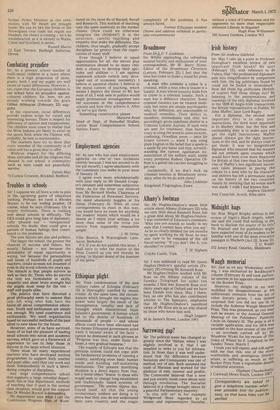Irish history
From Sir Andrew Gilchrist Sir: May I take up a point in Professor Donoghue's excellent review of two important Irish books? He says (February 15), with reference to de Valera, that "the professional diplomats pale into insignificance by comparison with him, the big politicians found he could not be fooled or intimidated." How did these big politicians (British, of course) find those things out? By listening to the interpretations and warnings of the only diplomat involved in the 1939-45 Anglo-Irish transactions, the British representative in Dublin, Sir John Maffey, later Lord Rugby.
For a diplomat, the second most important duty is to obey your instructions, the third most important is to disobey them; but the first and
• outstanding duty is to make sure you get the right instructions. Maffey almost always got the right instructions in the end, and he always tried to get them; it was no insignificant diplomat who ensured that his masters did not embark upon courses which would have been even more disastrous for Britain at that time than for Ireland. One of Maffey's less significant successors takes pleasure in paying this tribute to a man who by his character and abilities has left a permanent mark on the history a the two countries, mainly by ensuring that no worse mark was made. I wish I had known him.
Andrew ilchrist Pett Conachie, Avoch,Rntrse-shiGre

































 Previous page
Previous page